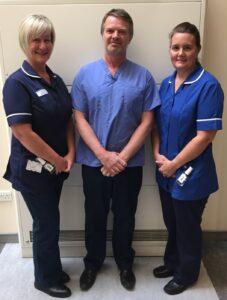AHSN NENC projects recognised as ‘pioneers’ in AF report
Two atrial fibrillation (AF) projects led by the Academic Health Science Network for the North East and North Cumbria have been acknowledged in an international report.
The Healthcare Pioneers Report, published annually to coincide with Global AF Aware Week (16-22 November), showcases the most innovative approaches to detecting and managing AF.
Of the 11 case studies in this year’s publication, two relate to innovative work led by the AHSN NENC in collaboration with partners across the region. These include the AF detection work in a rural community setting with Cumbria Fire and Rescue Service, and a project with community nurses at North Tees and Hartlepool NHS Foundation Trust to prevent AF-related strokes in high-risk cardiac patients.
The aim of the Healthcare Pioneers Report is to provide models of best practice that other centres, across the globe, can adapt to improve the care and quality of life with people with AF.
As part of the AHSN’s national AF programme, which aimed to improve the detection and treatment of AF by rolling out the use of a pulse check device – called AliveCor – at a range of healthcare settings, the AHSN NENC worked closely with Cumbria Fire and Rescue Service to implement the use of AliveCor as part of the service’s Safe and Well visits, which focused on older, more frail and vulnerable people.
Steve Healey, Chief Fire Officer for Cumbria Fire and Rescue Service, said: “Keeping our communities safe, as well as those who work with us and for us, is at the heart of everything we do and being recognised in the Healthcare Pioneers Report is a testament to that.
“Cumbria Fire and Rescue Service use the AliveCor device to check people for atrial fibrillation as part of our Safe and Well visits, which also includes pulse checking, alcohol reduction, smoking cessation, social wellbeing and falls prevention. One woman, who was subsequently diagnosed with AF, said that had it not been for the visit of the Fire & Rescue crew, she may never had known she had AF, leading to potential life changing consequences.
“Well done and thank you to everybody in the team on this achievement, it’s something we should all be proud of and demonstrates fantastic partnership working with AHSN NENC, to ensure we keep our communities as safe as possible.”
The AHSN NENC also allocated devices to the Cardiac Rehabilitation team, Community Stroke & Rehabilitation team and Community Nursing team at North Tees and Hartlepool NHS Foundation Trust. These teams generated the highest detection rate of all places allocated the devices (23%) and in addition, improvements were seen in service efficiencies with increased remote monitoring of cardiac devices.
 Louise Hoyland, senior clinical matron for North Tees and Hartlepool NHS Foundation Trust, said: “Our community heart failure team jumped at the chance to be part of this innovative work which involved using the AliveCor hand held devices during home visits to patients.
Louise Hoyland, senior clinical matron for North Tees and Hartlepool NHS Foundation Trust, said: “Our community heart failure team jumped at the chance to be part of this innovative work which involved using the AliveCor hand held devices during home visits to patients.
“Within the community heart failure team, the AliveCor devices were used 1,086 times and 251 abnormal rhythms were detected. That could be ten strokes that were prevented. We’re hoping we can continue this work as detecting 251 abnormal rhythms is a massive success.”
Nikki Holdsworth, AF Project Lead at the AHSN NENC, said: “We are incredibly proud to see these regional AF projects, which are making a real difference to people across the North East and North Cumbria, gain recognition in the internationally significant Healthcare Pioneers Report.
“There are so many innovative approaches to identifying and treating AF and it’s fantastic to be able to share our successes and learnings with colleagues from around the world. For the North East and North Cumbria to be amongst those leading the way in this area of work is fantastic. Well done to Cumbria Fire and Rescue Service, North Tees and Hartlepool NHS Foundation Trust Community Nursing Teams and everyone we have worked with as part of our regional AF programme over the last four years.”
An international panel of judges, including President of Arrhythmia Alliance and Co-Founder/Trustee of AF Association Professor John Camm, selected the case studies from submissions across the globe. The judges were tasked with the difficult challenge of identifying case studies that showcased the most original and effective approaches to improving the management of AF. They specifically looked for Healthcare Pioneers who focused on meeting the needs and wants of patients in their innovative approaches.
Professor John Camm, St George’s University of London, said: “The Healthcare Pioneer Report initiative encourages healthcare professionals to showcase their best examples of recent developments in the health care of patients with AF. This global disease has reached epidemic proportions and we all need to pick up good methods of caring for people with this heart rhythm disturbance. When you read the report, you will appreciate the wide range of opportunities and solutions that have been described. Well done to all of you who submitted your ideas and on how they have worked out in practice.”
Read the full report here: https://www.heartrhythmalliance.org/files/files/Healthcare%20Pioneers%202021(1).pdf
